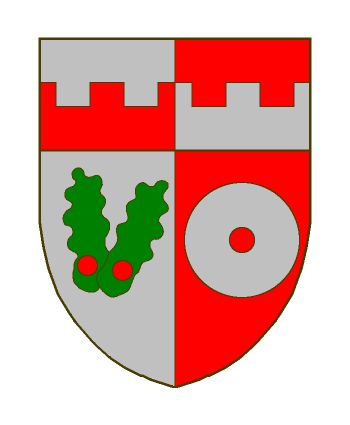Zemmer: Difference between revisions
Knorrepoes (talk | contribs) m (Text replacement - "/Arms of " to "/Arms (crest) of ") Tags: Mobile edit Mobile web edit |
Knorrepoes (talk | contribs) m (Text replacement - "{{media}}" to " {{de1}} {{media1}}") |
||
| Line 25: | Line 25: | ||
The chief symbolises a long Roman defense wall from the 2nd century AD, that ran through the area of what is now the municipality. The oak branches refer to the local Meulenwald forest. The mill wheel refers to the sandstone mining and processing which was of great importance for the village for several centuries. Millstones were a typical product from the workshops. | The chief symbolises a long Roman defense wall from the 2nd century AD, that ran through the area of what is now the municipality. The oak branches refer to the local Meulenwald forest. The mill wheel refers to the sandstone mining and processing which was of great importance for the village for several centuries. Millstones were a typical product from the workshops. | ||
{{ | |||
{{de1}} | |||
{{media1}} | |||
[[Civic Heraldry Literature - Germany|'''Literature''']]: Information from Verbandsgemeinde Trier-Land | [[Civic Heraldry Literature - Germany|'''Literature''']]: Information from Verbandsgemeinde Trier-Land | ||
Revision as of 11:10, 26 December 2022
This page is part of the German heraldry portal |
Heraldry of the World |
|
German heraldry:
|
Selected collector's items from Germany:
|
ZEMMER
State : Rheinland-Pfalz
District (Kreis) : Trier-Saarburg (until 1969 Trier)
Verbandsgemeinde : Verbandsgemeinde Trier-Land
| German |
Schildhaupt gespalten und durch Zinnenschnitt vorn silbern-rot, hinten rot-silbern geteilt. Darunter silbern-rot gespalten. Vorn zwei grüne Eichenblätter mit zwei roten Eicheln. Hinten ein silberner Schleifstein. |
| English | No blazon/translation known. Please click here to send your (heraldic !) blazon or translation |
Origin/meaning
The arms were officially granted on January 2, 1992.
The chief symbolises a long Roman defense wall from the 2nd century AD, that ran through the area of what is now the municipality. The oak branches refer to the local Meulenwald forest. The mill wheel refers to the sandstone mining and processing which was of great importance for the village for several centuries. Millstones were a typical product from the workshops.
Literature: Information from Verbandsgemeinde Trier-Land


